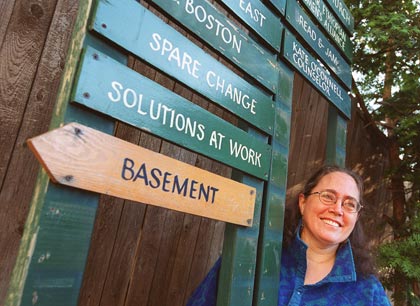More than a ‘fair exchange’

“What do you need to get your life back?”
This is the question Macy Delong asks people who come to Solutions at Work seeking help moving out of homelessness.
Faced with such a question many feel their needs are too great to be met by any one agency. Perhaps what they need is decent, warm clothing for their children, a working refrigerator delivered to their newly acquired apartment, a functioning car that will enable them to travel to a new job 20 miles away.
But for Delong’s agency, these needs are neither outrageous nor extravagant.
“We realize that for people to make the leap from the situation they’re trapped in, they need tangible things,” Delong said.
From her office in the Old Cambridge Baptist Church, a small basement room that somehow manages to be cheerful and welcoming despite having only one small window with a ground-level view of the parking lot, Delong manages a staff of seven, serving approximately 4,000 clients a year.
Solutions at Work, founded 12 years ago, is able to meet such a wide variety of tangible needs because of the novel, innovative way it operates. Its children’s clothing exchange, for example, is the only nonretail, pre-owned clothing service in the Boston area.
Based on the idea that even cheap used clothing can be out of reach for people with little or no financial resources, the Clothing Exchange functions on the principle of a communal storage closet. A woman might trade her child’s sandals and shorts for long pants and a down jacket, or a set of baby clothes for toddler’s wear. Books and toys are also available. Those with nothing to trade are not turned away. They simply sign up to do volunteer work.
To illustrate the difference the Children’s Clothing Exchange can make in the life of a person in crisis, Delong tells the story of a woman who showed up at the exchange just before closing time with four children inadequately dressed for the bitter fall weather. The woman was fleeing an abusive relationship in Puerto Rico and had spent all the money she had on airfare. A foray through the clothing racks turned up a new winter wardrobe for the shivering and disoriented family.
“If you’re in crisis, we deal with it. If you have nothing to exchange, then you can exchange your time. If people can’t do that, then I ask them to do something somewhere else in the community, so the exchange helps somebody.”
Solutions at Work follows the same approach with its other programs. Its furniture bank gives people the household items they need, from beds to refrigerators to a set of dishes, and delivers them free of charge. The volunteer moving service, Moving Up, will even deliver furniture on weekends, and, in sensitivity to clients, the signage on its truck says nothing about homelessness. As far as the neighbors are concerned, no one has to know that the refrigerator or wardrobe being trundled upstairs by a pair of energetic workmen has been supplied by a charitable organization.
A new program, Wheels, makes functional, donated cars available to people who need them. The cars must pass inspection and be drivable for at least two years beyond that point. Who gets them? Low-income people who otherwise won’t be able to maintain a job, people with HIV who need personal transportation to connect with their support system – basically, anyone who can demonstrate a need for a reliable vehicle.
The agency’s philosophy of responding generously and compassionately to the needs of people in crisis comes out of Delong’s own experience. A former researcher in Harvard’s Biological Laboratories, she took a leave of absence when she became incapacitated by bipolar illness. A series of events then resulted in her becoming homeless. Eventually she got treatment for her mental illness and was able to get her life back, but her experiences in homelessness had permanently altered how she looked at the world.
“When you’re homeless, you’re not valued,” she said. “No one trusts you. To the state, you’re just one more burden. No one thinks you need anything except food and shelter.”
Delong realized that people who have fallen through the cracks need more than necessities if they are to make a successful transition out of homelessness. In addition to providing the material conditions of a decent life, the agency also addresses mental and emotional needs.
Solutions at Work employs up to 10 transitional workers at any given time, providing paid, on-the-job training as program managers.
“When you’re working here, you’re valued, you’re important, you fill a critical slot,” Delong said.
Another recently developed program addresses the issue of homelessness from a systemic level. Speak Up helps those who have been homeless to understand their experience from a wider perspective and to advocate for the homeless as public speakers and participants in the legislative process.
Like all the programs that make up Solutions at Work, Speak Up takes a positive attitude toward those who have been affected by homelessness, seeing them not as victims but as valuable members of society who simply need help overcoming the obstacles that life has thrown their way.
“As people come and go within the organization, we try to figure out what their needs and strengths are, and then we come up with ways to support those needs and value those strengths,” Delong said.
Contributions to Solutions at Work can be made by filling out the green card in the Community Gifts Through Harvard pledge packet.
Contact Ken Gewertz at ken_gewertz@harvard.edu




